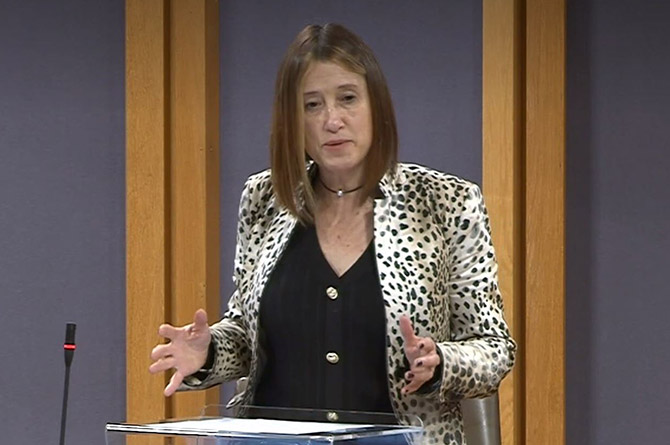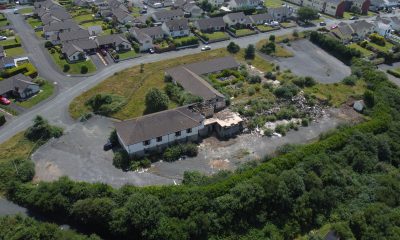Politics
Plans unveiled for new seat boundaries ahead of next Senedd election

PLANS to create 16 “super constituencies” for the 2026 Senedd election have been unveiled.
The Democracy and Boundary Commission Cymru has published initial proposals to redraw Wales’ political map, replacing the current 40 constituencies and five regions.
In 2026, the Senedd will expand from 60 to 96 members and adopt a new electoral system, with the 32 constituencies used in July’s Westminster general election paired to create 16.
The new system would use the new constituency boundaries used at the last UK general election.
The initial proposals would see the Caerphilly constituency paired with the Blaenau Gwent and Rhymney seat, while Newport West and Islwyn would join with Newport East.
The boundary commission has proposed the following constituencies which would each be represented by six Senedd members:
- Bangor Aberconwy Ynys Môn
- Clwyd
- Alyn, Deeside and Wrexham
- Dwyfor Meirionnydd, Montgomeryshire and Glyndwr
- Ceredigion and Pembrokeshire
- Carmarthenshire
- Swansea West and Gower
- Brecon, Radnor, Neath and Swansea East
- Aberafan Maesteg, Rhondda and Ogmore
- Merthyr Tydfil, Aberdare and Pontypridd
- Blaenau Gwent, Rhymney and Caerphilly
- Monmouthshire and Torfaen
- Newport and Islwyn
- Cardiff East and North
- Cardiff West, South and Penarth
- Vale of Glamorgan and Bridgend
Dwyfor Meirionnydd, Montgomeryshire and Glyndwr would stretch from the coast to the border, with the commission saying such a large constituency is not ideal but the best option.
In the full 51-page report, the commission sets out the criteria for the 2026 boundary review, including local ties, shared history, the Welsh language and socio-economic considerations.
Ynys Môn and Dwyfor Meirionnydd, for example, was not considered viable because it is not possible to travel by road from one to the other without entering Bangor Aberconwy.
A four-week consultation has opened seeking people’s views on the initial proposals, with suggestions for different pairings and constituency names welcomed.
Following the initial consultation, which ends on September 30, the independent commission will publish revised proposals in December.
Then a second four-week consultation will follow in January, with a final decision expected to be published in March 2025 ahead of the next Senedd election in May 2026.
A further review will be held after the election, with the commission given more leeway to formulate constituencies which could vary in number of voters by as much as 20%.
Shereen Williams, chief executive of the Democracy and Boundary Commission Cymru, said: “The commission is confident our initial proposals represent a very good first step….
“But we know from experience that these processes are always strengthened when we hear from the public.
“So we strongly encourage everyone to share their views with us, whether they support or oppose the proposals, so we can further strengthen the map ahead of the next election.”
Speaking on the Hiraeth podcast about Welsh politics, Ms Williams described the review as a jigsaw, with the commission tasked with ensuring all the pieces fit and make sense.
She cautioned: “You can’t get a perfect map of constituency boundaries across the country.”
Readers can have their say on the proposals by visiting the commission’s website, emailing consultations@dhcc.gov.wales or by post to DBCC, Cathays Park, Cardiff CF10 3NQ.
Darren Millar, the Conservatives’ shadow constitution minister, reiterated his party’s opposition to Senedd expansion, describing electoral reform as the wrong priority.
He said: “More boundary changes will cause further upheaval and confusion for those who have already had to contend with boundary changes in council and Westminster elections.
“We need a Welsh Government that is focused on getting to grips with problems in our NHS, education system and economy – not one that is obsessed with more politicians and constitutional change.”
Mike Hedges, who represents Swansea East, was surprised to see Neath and Swansea East paired with Brecon, Radnor and Cwm Tawe rather than Aberafan Maesteg.
The Labour backbencher raised concerns about the size of the proposed new Brecon, Radnor, Neath and Swansea East constituency.
Mr Hedges said: “It will be a very big constituency from St Thomas Swansea to Presteigne in Radnorshire – over 80 miles and over two hours’ driving.”
Plaid Cymru described the reforms as a long-overdue move to strengthen Welsh democracy.
The party said: “From 2026, the people of Wales will be better represented and the Welsh Government can be more effectively scrutinised
“We look forward to engaging with the commission to ensure new Senedd constituencies take full account of … geographic, historical, and linguistic considerations.”
The Welsh Government welcomed the initial report as an important first step in the public consultation and stressed it has no role in the independent boundary review process.
A spokesperson said: “We encourage interested parties to engage to help shape the new Senedd electoral constituencies.”
When the final report is published, ministers will be required to bring forward regulations and will not be able to deviate from the recommendations which will not need Senedd approval.
The boundary review forms part of wider reforms to Senedd elections.
Under the Senedd Cymru (Members and Elections) Act, which was passed in May, a new electoral system will be introduced from 2026, meaning boundaries need to be redrawn.
Proponents of the reforms argue a bigger, more proportional Senedd will make it a more effective parliament, better able to hold the Welsh Government to account.
Meanwhile, those opposed point to the estimated £18m-a-year cost of expanding the Senedd, arguing resources would be better spent on schools and hospitals.
Ultimately, the reforms are happening due to the current parliamentary arithmetic which provides a potentially once-in-a-generation opportunity.
A supermajority was needed to pass the law. Labour and Plaid Cymru did not have the numbers in the five years to 2021 and polls suggest they may fall short of two-thirds in 2026.
Currently, Wales uses an additional member system – a mix of proportional representation and the first-past-the-post system used in Westminster elections.
Forty constituency Senedd members are elected via first past the post and a further 20 are elected to represent five regions via party lists.
But from 2026 voters will receive one ballot rather than two, with first past the post scrapped and all members elected via a full form of proportional representation.
Wales will use “closed lists”, which will see people voting for parties rather than specific candidates, despite experts describing the new system as dangerous.
Political parties will decide the order of candidates on lists unlike under a flexible-list system or the single transferable vote which would give the electorate a say.
The D’Hondt method, a formula to apportion seats based on votes, will continue to be used over the Sainte-Lague system which would benefit smaller parties.
News
Welsh Lib Dems call for expansion of free childcare across Wales

THE WELSH LIBERAL DEMOCRATS have pledged to make childcare a central pillar of their platform ahead of the 2026 Senedd elections, with a bold new commitment to offer 30 hours of free childcare per week for all children aged nine months to four years old.
During a visit to Meithrinfa Y Pelican nursery in Cardiff on Thursday (Apr 4), party leader Jane Dodds MS set out the plans ahead of the party’s Spring Conference. She said tackling high childcare costs was essential not only to ease the cost-of-living crisis for families, but also to support the Welsh economy.
“The extortionate cost of childcare is one of the biggest challenges families face,” Dodds said. “It’s not only impacting child poverty rates, but it’s also dragging down our economy and preventing parents – especially women – from pursuing the careers they want.”
Dodds highlighted the party’s recent success in securing £30 million through budget negotiations to expand the Flying Start programme. This funding will provide childcare for all two-year-olds in Wales and increase the hourly rate to support providers. However, she said this was just the beginning.
“If we are in a position to shape government policy after the next election, we will go much further,” she added.
During the visit, nursery staff outlined the challenges facing childcare providers, including rising National Insurance contributions, increased energy and water bills, and general inflation. Many nurseries have had to raise their fees simply to maintain minimum staffing levels.
Dodds emphasised that a vote for the Welsh Liberal Democrats next year would be a vote to reduce childcare costs, help families through the cost-of-living crisis, and stimulate the Welsh economy.
“Every child deserves the best possible start in life, no matter their background,” she said.
News
Neyland councillor threatens legal action under Equalities Act

NEYLAND TOWN COUNCIL is once again under scrutiny following a strongly worded letter from Councillor David Devauden, who has accused the Town Clerk of discrimination and threatened multiple legal actions.

In an email sent to fellow councillors and members of the public on Tuesday (Apr 1), Cllr Devauden alleges breaches of the Equalities Act 2010, as well as libel and harassment, in connection with ongoing disputes within the council.
Claims of discrimination and legal threats
The email alleges that the Town Clerk, Libby Matthews, has engaged in what Cllr Devauden describes as “the illegal practice of discrimination” against himself and fellow councillors Brian Rothero and Steve Thomas. He claims the Clerk has refused to respond to correspondence and has shown bias in favour of certain councillors.
“This is called OPENNESS, something we, as a Council, were proud to proclaim but failed to act on,” he wrote.
Drawing on his past experience as a part-time paralegal, Cllr Devauden stated he specialised in libel and discrimination law and accused the Clerk of misandry and malicious communications. He claims the complaints against him lacked evidence and were nothing more than “a misandristic rant.”
Ultimatum to Clerk
Cllr Devauden issued a 48-hour ultimatum to Libby Matthews, demanding her resignation “with no compensation and no benefits.” He warned that if she did not comply, he would pursue a case under the Equalities Act 2010 and other legislation.
“If you resign immediately then I will cease taking legal action against the Council,” he stated, though he added he could not guarantee the same for civil proceedings relating to social media posts alleging sexual harassment and excessive email communications.
He also warned of intended complaints to police under the Malicious Communications Act 1988 and the Protection from Harassment Act 1997, and stated his intention to pursue a libel case under the Human Rights Act 1998 if the allegations made against him are not substantiated with evidence.
Tensions continue to mount
The letter follows weeks of controversy surrounding the council, including the co-option of the Clerk’s mother to the council, accusations of secrecy, and increasing public dissatisfaction with council leadership.
As of now, the Town Clerk has not publicly responded to the letter.
Upcoming tribunal
The Pembrokeshire Herald has found that Cllr David Devauden is due to face a tribunal under reference APW/005/2024-025/CT, brought by the Adjudication Panel for Wales.
The hearing relates to alleged breaches of paragraphs 4(b), 4(c), 6(1)(a), 6(1)(d), and 6(2) of the Code of Conduct, which outline the following responsibilities:
- 4(b): Councillors must show respect and consideration for others.
- 4(c): Councillors must not use bullying behaviour or harass any person.
- 6(1)(a): Councillors must not conduct themselves in a manner likely to bring their office or authority into disrepute.
- 6(1)(d): Councillors must not disclose confidential information contrary to legal or policy obligations.
- 6(2): Councillors must not make vexatious, malicious or frivolous complaints against others.
The relevant authority is Neyland Town Council. Further details about the hearing are expected to be released in due course.
More referrals expected
A source close to the council has indicated that further referrals to the Adjudication Panel for Wales may be forthcoming, although this has not yet appeared on the public tribunal list.
Former councillor Andrew Lye also stated he has made a police complaint regarding what he describes as bullying by Cllr Devauden. He has expressed frustration over a lack of response from Dyfed-Powys Police and is considering referring the force to the Ombudsman over their handling of the complaint.
The Pembrokeshire Herald will continue to monitor developments and report on the outcome of any legal action or council response.
News
Cost of living crisis hitting older people hard, warns Commissioner

NEW data from the Older People’s Commissioner for Wales has revealed growing concern among older people across the country about the rising cost of living, with many being forced to cut back on essentials such as heating and food.
The findings come as household bills are set to rise again this week, sparking fears that older people will be pushed into further hardship, with serious risks to their health and well-being.
Polling carried out on behalf of the Commissioner shows that 90% of older people in Wales are now concerned about energy prices — a rise of nearly 20% compared to last year. Concerns over food prices have also grown, with 82% saying they are worried — up 14% on last year’s figures.
The survey also revealed that 70% of older people have reduced spending on heating their homes, and 60% have cut back on food.
Older People’s Commissioner for Wales, Rhian Bowen-Davies, said the figures paint a bleak picture.
“These findings highlight that there are significant concerns about the cost of living amongst older people across Wales, and that many feel they have no option but to cut back on essentials such as energy or food in order to pay their bills,” she said.
“It’s important to remember what this means in reality – that older people are unable to afford to heat their homes properly or may find themselves going hungry, which both put people’s health at risk.”
She added: “With prices for many things set to rise again this week, these concerns are likely to increase, and people may be forced to cut back even further, creating greater financial pressures, as well as stress and anxiety, which also impacts upon well-being.”
The Commissioner also warned that the loss of the Winter Fuel Payment has worsened the situation, removing a vital source of support for many older people.
“These issues make it more likely that older people will find themselves in vulnerable situations and in need of care and support, which not only have a significant impact on individuals, but also add avoidable costs and pressures to already stretched public services.
“It is vital that the governments in Westminster and Cardiff Bay recognise this and take action to provide support to protect older people from harm.”
-

 Charity7 days ago
Charity7 days agoEmergency services unite for charity at Pembroke Dock Fire Station
-

 Sport7 days ago
Sport7 days agoKildunne hat-trick rips Wales apart in record-breaking Six Nations clash
-

 Community7 days ago
Community7 days agoTenby comes alive with eccentricity as Steampunk Festival returns in style
-

 Education7 days ago
Education7 days agoSupported employment learners take off on airport adventure
-

 Community7 days ago
Community7 days agoFuneral arrangements confirmed for popular local entertainer, Matt Baker
-

 Business4 days ago
Business4 days agoSpaceX eyes Milford Haven for new UK facility
-

 Crime5 days ago
Crime5 days agoPembrokeshire farm worker accused of threatening to burn employer’s farm
-

 Crime5 days ago
Crime5 days ago‘Yeah but no but’ insult to female officer lands Monkton man with court fine
































